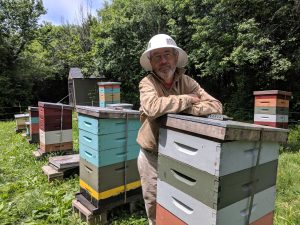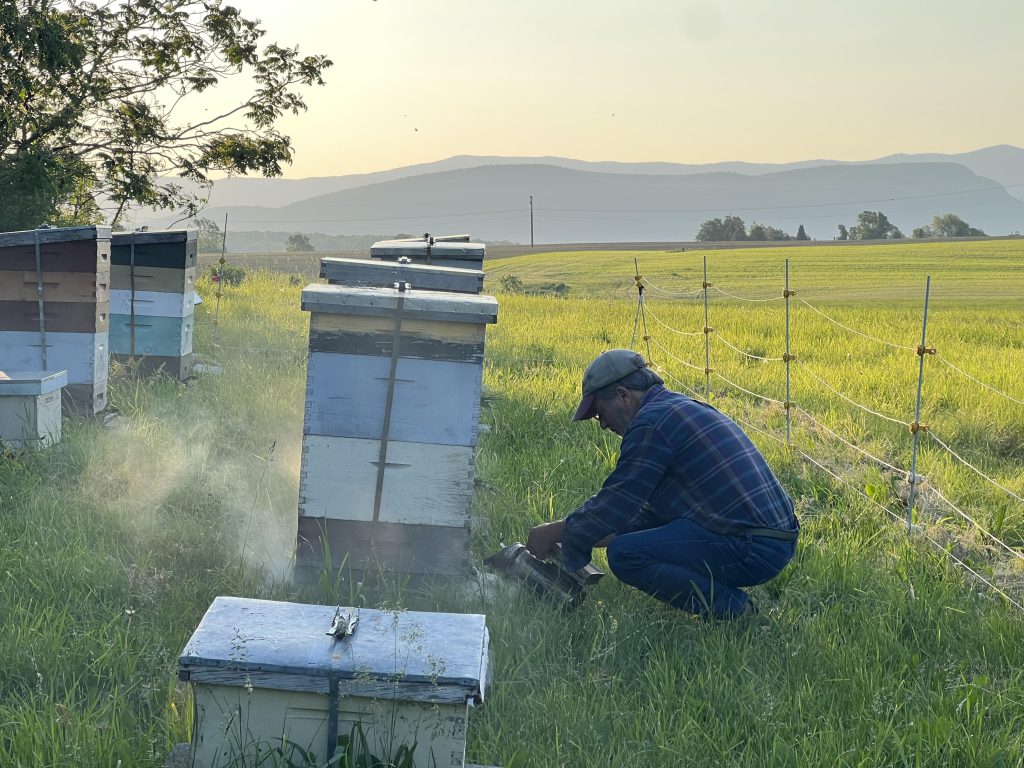Click Here if you listened. We’re trying to gauge interest so only one question is required; however, there is a spot for feedback!
Read along below!

Beekeeping
A Path to Some Economic Freedom
By: Ross Conrad
The economic upheaval of the recent COVID years has revealed weaknesses in our economic system and many of the unsung benefits we beekeepers can enjoy from practicing our craft. We saw what’s been called the “Great Resignation” where workers left their jobs in droves. One of the primary reasons employees quit was due to the way employers treated them. For others, it was the company culture and values that did not align with their own. For those stuck in dead-end jobs, the COVID Economic Impact Payments provided the financial buffer they needed to transition into a new working situation. The dramatic decrease in unemployment made it challenging for employers to hire help, but made it much easier for workers to leave lousy jobs. The ruling and economic elite hate low unemployment because then workers have options and it makes it too easy for them to leave their jobs for a better one. This also puts upward pressure on wages which decreases profits. Far too many employers rely on the Federal Reserve’s efforts to manipulate interest rates and keep living expenses high enough so people’s savings will get used up and there will be plenty of desperate workers willing to accept jobs that they normally would not take. The Fed also works to keep unemployment high enough so most workers would not dare to leave their jobs, no matter how bad they are, because there are lots of financially hurting people waiting in the wings to take their place and there is so much competition for work that getting a better job is difficult.
Higher interest rates put the brakes on the housing market but apparently too many consumers still flush with cash saved up during the pandemic continue to spend. When discussing the Fed’s increases in interest rates on the November 2, 2022 airing of National Public Radio’s Morning Edition, the President of the Federal Reserve Bank of Kansas City, Esther George, stated, “We see that there is a bit of a savings buffer still sitting for households, that may allow them to continue to spend in a way that keeps demand strong,” she said. “That suggests we may have to keep at this for a while.”
NPR’s Morning Edition also interviewed Federal Reserve Chair Jerome Powell who stated: “No one knows whether there’s going to be a recession or not, and if so, how bad that recession would be… Our job is to restore price stability so that we can have a strong labor market that benefits all, over time.” Of course, Powell’s idea of a strong labor market is one where there are lots of people out of work so that employers have no problem finding workers for jobs that offer poor pay and few-to-no benefits. The “all” that benefit from the price stability of more people out of work due to higher interest rates is the business class, not the majority of the people who work for a living.

While most beekeepers are backyard part-timers with a few hives, a small percentage of beekeepers make a part-time, or full-time, business of beekeeping, and it is these beekeepers that account for the majority of managed honey bee colonies.
In honey bee economics, each individual bee’s efforts are primarily aimed at supporting the common good of the whole. No worker tries to monopolize hive resources and control or restrict access to the rest of the colony for their own personal gain. With a few notable exceptions, most of human culture that’s dedicated to the capitalist economic system works in the opposite way of a honey bee colony. Greed is promoted and rewarded. Monopolization, consolidation of power and control of the market is the goal, and employees are seen as an expense that should be minimized as much as possible, and are too often considered disposable. Unskilled laborers in particular are treated with little respect and dignity.
Of course no employee ever gets paid what they’re actually worth. The system is designed so that a company must purchase your labor wholesale so they can sell it retail. We have all been well indoctrinated into accepting this situation as the natural order of things but it took a long time to get us to this point. The first factories to open up and hired unskilled laborers at the dawn of the industrial age were greeted with strong opposition and protests from the populace. Rather than a person using a skilled craft to produce something useful that they could then sell or barter, individuals traded their time for money doing jobs that most anyone could do with a little training. Folks back then saw this for what it was, treating people with disrespect and compromising their independence and dignity.
People believed there was little difference between being a factory worker and a slave. Of course the factory worker’s situation is supposed to be voluntary and temporary since they can choose to quit at any time. Unlike a slave that the slave owner has to house, feed and clothe, the factory worker is expected to use their meager earnings to purchase their own accommodations and necessities and hope there is enough left over for a little discretionary spending.
To prevent employees from scrimping and saving so they can afford to eventually leave their jobs, companies took a page from indentured servitude farmers and establish company stores to provide their employees with goods, and built lodging to rent to workers, all at rates designed to ensure they could never afford to leave.
There are those who argue that working for others provides great benefits such as a reliable working situation, a greater sense of one’s basic needs being provided for which can instill a sense of personal security and stability, and not having to take the financial risks of running your own business. While this is all true, much of the same can also be said of slavery.
As far back as 44 BC, Cicero is quoted as saying “vulgar are the means of livelihood of all hired workmen whom we pay for mere manual labor, not for artistic skill; for in their case the very wage they receive is a pledge of their slavery.”
When Fredrick Douglass took a paying job, he is reported to have declared “Now I am my own master.” After life as a slave, receiving a wage that you can decide how to spend can feel like you have some level of freedom. Only later did he realize to the contrary, “experience demonstrates that there may be a slavery of wages only a little less galling and crushing in its effects than chattel slavery, and that this slavery of wages must go down with the other.”
Through a craft like beekeeping, one has the opportunity to escape wage slavery, choose their own hours and make their own decisions. Sure they take on all financial risks, but they also get to enjoy all the financial benefits. Beekeepers may not become millionaires from their efforts, but there is immense satisfaction that comes from being your own boss and living the agrarian lifestyle.
We have become well indoctrinated into maintaining capitalism and identifying with it as our means of survival for so long, that the idea of people working together, rather than competitively, to meet their collective needs like in the example of the bee hive, seems improbable if not impossible. What would we get in return for our selfless efforts to help maintain each other’s existence?
One well established economic model inspired by bees and the rest of the natural world comes in the form of the cooperative business. Work that is not based upon individual craft work can be organized by worker self-management. An example is Sioux Bee Honey, a beekeeper owned co-operative that notes on its website: “One bee can’t do it all, neither can one farmer. It’s why five humble beekeepers from Sioux City, Iowa, formed a co-op to share equipment and resources to bring more honey to market. It’s a way of doing business where family farms stay in the family and decisions are made democratically.”
Like all farming, beekeeping provides the foundation for a strong and resilient economy by creating new human centric wealth from the communal wealth of the natural world. Almost all other businesses and economic activities simply reorganize human centric wealth that already exists in order to extract more wealth, but farming in general and beekeeping specifically, combine sun, air, water and earth with the efforts of a bee colony to create new wealth (e.g. honey, beeswax, etc.) that did not previously exist. This is why agricultural revolutions must come before industrial or economic revolutions.
Beekeeping provides self-employment and all the social and economic benefits that go with it. The greatest advantage is throwing off the yoke of wage slave employment in our increasingly volatile economy and not being subject to the whims of “at will” employers. You also get to write-off legitimate beekeeping expenses on your tax return, reducing your tax bill so you get to keep more of your hard-earned money.
Beekeeping also appears to be somewhat technologically future-proof. The nature of beekeeping work suggests that despite current efforts to replace humans with robots and artificial intelligence in many areas of the economy, beekeeping is unlikely to ever become fully automated. There is a long list of technological promises like the paperless office that computers were supposed to create, less toxic pesticide use thanks to genetically engineered organisms, and electricity from nuclear power plants that is too cheap to meter, all of which never came to fruition. Sure there are sensors and gadgets we can use to monitor hives and provide real-time data on colonies, but a human being knowledgeable in honey bee management, biology, pests and pathogens, along with a working knowledge of meteorology and apiary goal considerations will still be needed to analyze the data and determine the best course of action to take, as well as carry out the necessary physical hive manipulations in the field.
When planned accordingly, beekeepers have a better chance of avoiding on-the-job burnout by freeing up some of their time, since unlike other farm and domesticated animals; bees do not need daily attention. Of course a beekeeper can keep so many colonies that they end up working seven-days-a-week, but a beekeeper can enhance their time flexibility by choosing to keep the number of colonies down to a manageable amount that can be worked within whatever number of days a week the beekeeper wants to work on a regular basis.
A little bit of economic freedom, allows you to make choices. We, who live in the highly developed countries of today, have choices unparalleled in the history of mankind. We can chase after money and be incredibly wealthy, get an amazing education, choose to be lazy, or try to make the world a better place. We have many choices but to exercise those choices it helps a lot to have some economic freedom. Beekeeping is one way to provide some of that freedom.
Ross Conrad is the author of Natural Beekeeping, Revised and Expanded 2nd edition, and The Land of Milk and Honey: A history of beekeeping in Vermont.








